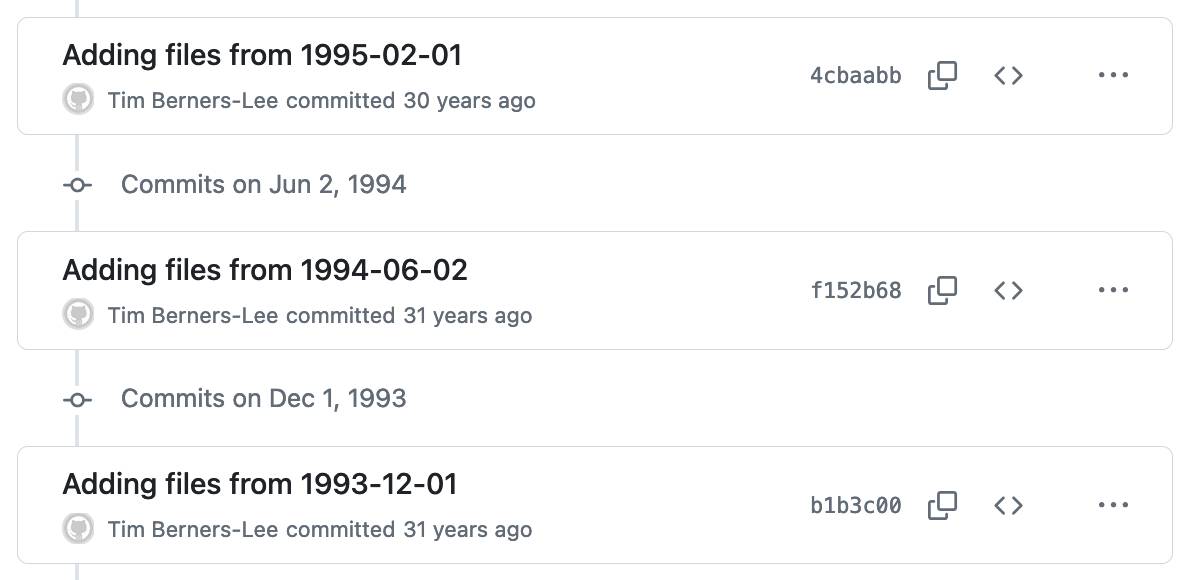11 posts tagged “tim-berners-lee”
2025
I believed that giving users such a simple way to navigate the internet would unlock creativity and collaboration on a global scale. If you could put anything on it, then after a while, it would have everything on it.
But for the web to have everything on it, everyone had to be able to use it, and want to do so. This was already asking a lot. I couldn’t also ask that they pay for each search or upload they made. In order to succeed, therefore, it would have to be free. That’s why, in 1993, I convinced my Cern managers to donate the intellectual property of the world wide web, putting it into the public domain. We gave the web away to everyone.
— Tim Berners-Lee, Why I gave the world wide web away for free
2024
1991-WWW-NeXT-Implementation on GitHub. I fell down a bit of a rabbit hole today trying to answer that question about when World Wide Web Day was first celebrated. I found my way to www.w3.org/History/1991-WWW-NeXT/Implementation/ - an Apache directory listing of the source code for Tim Berners-Lee's original WorldWideWeb application for NeXT!
The code wasn't particularly easy to browse: clicking a .m file would trigger a download rather than showing the code in the browser, and there were no niceties like syntax highlighting.
So I decided to mirror that code to a new repository on GitHub. I grabbed the code using wget -r and was delighted to find that the last modified dates (from the early 1990s) were preserved ... which made me want to preserve them in the GitHub repo too.
I used Claude to write a Python script to back-date those commits, and wrote up what I learned in this new TIL: Back-dating Git commits based on file modification dates.
End result: I now have a repo with Tim's original code, plus commit dates that reflect when that code was last modified.

The original WWW proposal is a Word for Macintosh 4.0 file from 1990, can we open it? (via) In which John Graham-Cumming attempts to open the original WWW proposal by Tim Berners-Lee, a 68,608 bytes Microsoft Word for Macintosh 4.0 file.
Microsoft Word and Apple Pages fail. OpenOffice gets the text but not the formatting. LibreOffice gets the diagrams too, but the best results come from the Infinite Mac WebAssembly emulator.
2018
A rating system for open data proposed by Tim Berners-Lee, founder of the World Wide Web. To score the maximum five stars, data must (1) be available on the Web under an open licence, (2) be in the form of structured data, (3) be in a non-proprietary file format, (4) use URIs as its identifiers (see also RDF), (5) include links to other data sources (see linked data). To score 3 stars, it must satisfy all of (1)-(3), etc.
2017
Crossdressing, Compression, and Colliders: ’The First Photo on the Web’. TIL the first photo shared on the web was of Les Horribles Cernettes, an all-female comedy musical group at CERN who performed songs about particle physics. And Sir Tim Berners-Lee first met them when he played the dame in the CERN panto.
2007
Giant Global Graph. Tim Berners-Lee points out that the Semantic Web is designed to solve problems such as portable social networks.
2006
Why Tim Berners-Lee is Wrong. Elliotte thinks XHTML is not the problem. I’m not convinced.
Tim Berners-Lee: Reinventing HTML. “It is necessary to evolve HTML incrementally.” W3C to work on HTML again.
Neutrality of the Net. Tim Berners-Lee on the most important issue facing the ’net today.
2004
TBL on TLDs
Tim Berners Lee (how many TLA celebrities is that now?): New Top Level Domains Considered Harmful. Read the whole thing—Tim blows the .xxx and .mobi proposals out of the water and takes a neat swipe at for-profit registrars in the process. Reading this, the main thing that struck me is how incredibly forward thinking TBL really is. People complain about the long duration of W3C processes and the futuristic nature of the semantic web but the W3C are trying to build technologies that will still be relevant ten or twenty years from now. When you consider the longevity of TCP/IP, this is a really smart strategy. It’s a shame so many people involved with the web have trouble thinking past the next few months.
2003
Web’s inventor gets a knighthood (via) Sir Tim Berners-Lee.